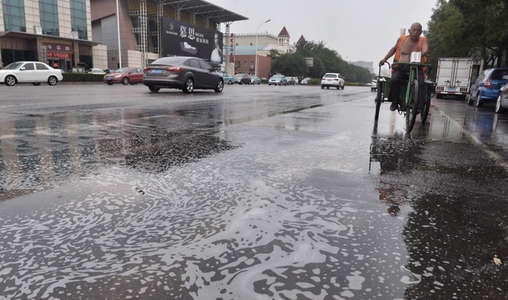Authorities are in a race to clean up hundreds of tons of chemicals at the site of the Tianjin explosions on concerns that rain could release deadly gas.
由于擔(dān)心降雨會傳播有毒氣體,有關(guān)部門正在天津爆炸現(xiàn)場處理數(shù)百噸化學(xué)品。
As rain began to fall on the morning of August 18, white-colored foam streamed onto city pavements, with some local residents complaining about a burning sensation in their lips and joints, though authorities did not say what caused the foam.
8月18日早間,天空開始下雨,人行道出現(xiàn)了白色泡沫,許多當(dāng)?shù)鼐用癖г狗Q嘴唇和關(guān)節(jié)出現(xiàn)燒灼感,有關(guān)部門還沒有公布泡沫發(fā)生的原因。

During a news conference on August 18, Bao Jingling, the chief engineer of the Tianjin Environmental Protection Bureau said workers have conducted two rounds of search and clean-up efforts to collect and clean the toxic chemical sodium cyanide, but sodium cyanide dust from the explosion would remain a large risk.
在8月18日舉行的新聞發(fā)布會上,天津市環(huán)保局總工程師包景嶺稱工作人員進(jìn)行了兩次搜尋,采集并清理有毒化學(xué)品氰化鈉,但是因爆炸而產(chǎn)生的氰化鈉粉塵仍然存在一定的風(fēng)險。
Bao warned local residents against exposing themselves to rain because if the dust is mixed with water, it triggers the formation of hydrogen cyanide, a colorless and highly poisonous liquid that becomes a vapor at even slightly above room temperature.
包強(qiáng)調(diào)稱當(dāng)?shù)鼐用癫灰c雨水直接接觸,如果粉塵遇水將變成氰化氫,這是一種無色的劇毒性液體,超過常溫將變成蒸汽。
The death toll for the August 12 blasts at a chemicals warehouse in Tianjin Port has risen to 114 people.
8月12日,天津港化學(xué)倉庫爆炸已造成114人死亡。
Workers have been using hydrogen peroxide to neutralize the chemicals near the site, but Liu Peinian, a professor of material science at East China University of Science and Technology, said that the use of hydrogen peroxide can damage the environment, although the harms are still far less great compared to the deadly chemical sodium cyanide.
在爆炸地周邊,工作人員正在用過氧化氫進(jìn)行中和,華東理工大學(xué)材料科學(xué)教授劉培念稱,使用過氧化氫將有害環(huán)境,盡管這樣的傷害要比化學(xué)劇毒氰化鈉要小得多。
譯文屬可可英語原創(chuàng),未經(jīng)允許,不得轉(zhuǎn)載。











